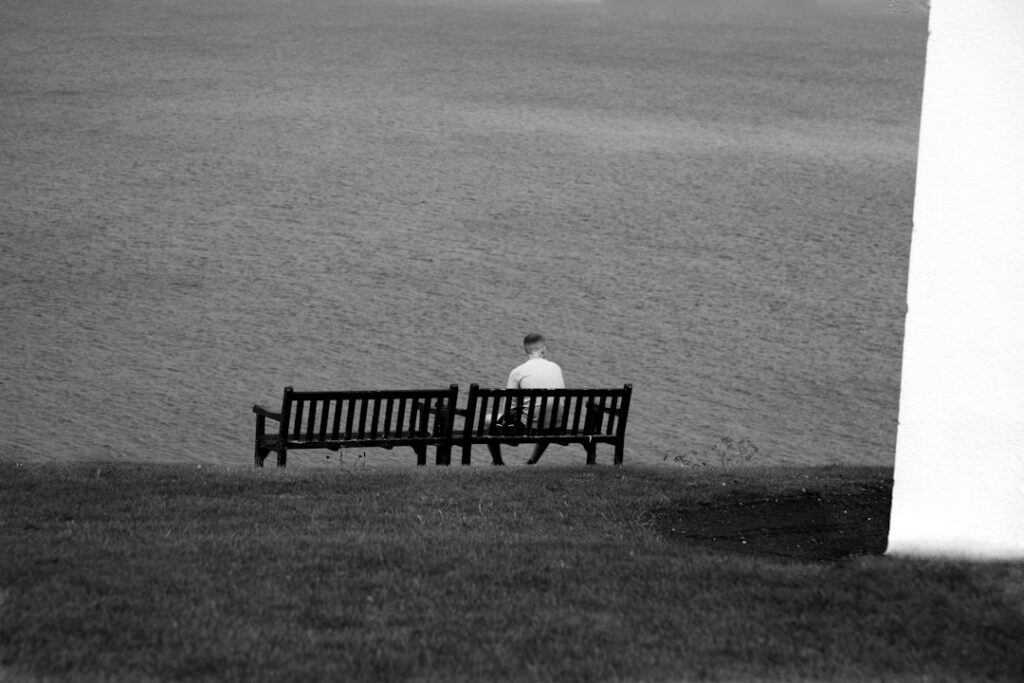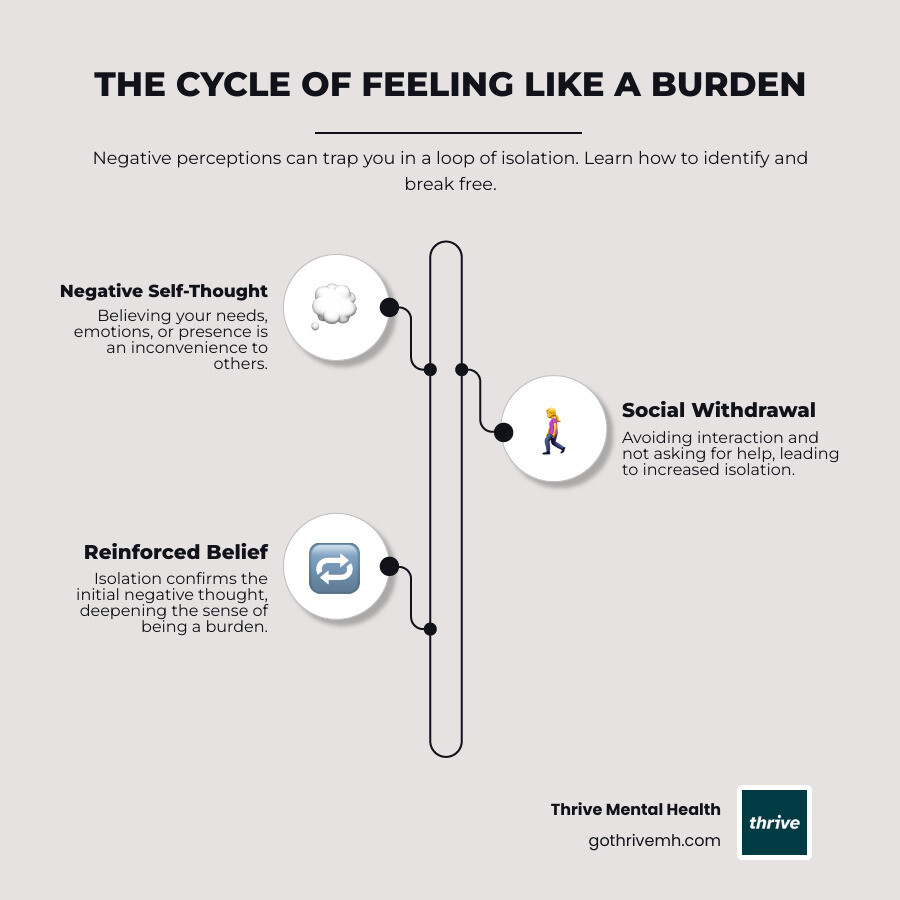The Ultimate Guide to Feeling Like a Burden & Healing

The Heavy Weight of Feeling Like a Burden
Why Do I Feel Like a Burden? The Ultimate Guide to Healing
If you or someone you know is in crisis or having thoughts of suicide, please call or text the 988 Suicide & Crisis Lifeline at 988. You are not alone.
If you constantly feel like your needs, emotions, or very existence are an inconvenience to others, you’re not alone. This guide will explore why you feel like a burden and provide a clear path to healing. The belief that you’re a burden is exhausting, but it doesn’t reflect reality.
Quick Answer: What You Need to Know
Why you might feel like a burden:
- Childhood experiences: High parental expectations, emotional neglect, or being given too much responsibility too young.
- Mental health conditions: Anxiety, depression, trauma, or low self-esteem distort your self-perception.
- Cultural pressure: Society’s glorification of independence makes asking for help feel like failure.
- Past relationships: Toxic dynamics taught you to hide your needs.
How to heal:
- Challenge negative self-talk.
- Practice self-compassion.
- Develop assertive communication.
- Build mutual support relationships.
- Prioritize self-care and autonomy.
- Recognize you deserve support.
- Seek professional therapy when needed.
According to the American Psychological Association, 71 percent of people aged 18–35 don’t talk about their stress because they worry about being a burden. This feeling, sometimes called the “burden complex,” is isolating and can lead to serious mental health risks like depression and anxiety.
But this feeling is a distortion, not a fact. The people who care about you want to support you. I’m Anna Green, LMHC, LPC, Chief Clinical Officer at Thrive Mental Health. In this guide, I’ll share clinical insights and practical strategies to help you reclaim your worth.

Find more about Why Do I Feel Like a Burden? — and How to Heal:
- Somatic Therapy vs. EMDR: Which is Right For You?
- how somatic therapy works
- somatic experiencing for anxiety
The Hidden Roots: Why You Might Feel Like a Burden
The feeling of being a burden has deep roots in your childhood, mental health, and societal messages. Understanding these origins is the first step to healing.
How Childhood and Family Dynamics Shape This Feeling
Our earliest experiences often plant the seeds of feeling like a burden.
- High Parental Expectations & Perfectionism: Growing up with conditional love teaches you that your worth is tied to flawless performance. Perfectionism becomes a defense mechanism to avoid disappointing anyone, but it’s an exhausting way to live.
- Emotional Neglect: If your feelings were ignored or dismissed in childhood, you learned to suppress your emotional needs, believing they are an inconvenience to others.
- Childhood Trauma: Being forced into adult roles too early (parentification) or feeling responsible for household chaos can teach you that you must constantly “earn your keep.” Our guide on Understanding Childhood Trauma: Healing Into Adulthood explores this further.
- Narcissistic Parents: Children of narcissists learn to prioritize their parent’s needs above their own. This often leads to a fawning response, where people-pleasing becomes a survival mechanism. Learn more in our article on Coping with a Narcissistic Mother: Breaking Free from the Fawning.
Psychological Factors and Mental Health Conditions
Certain mental health conditions can amplify the feeling of being a burden.
- Low Self-Esteem: A core belief that you are not worthy of love or support makes it nearly impossible to accept help from others.
- Anxiety: Anxiety magnifies the fear that you are annoying or disappointing others, causing you to catastrophize normal interactions. See how Anxiety Symptoms can manifest.
- Depression: Depression filters every interaction through a negative lens, telling you that you’re fundamentally flawed and everyone would be better off without you. Learn more about What Is Depression?.
- Complex Trauma: Past abuse or neglect can create a core belief that you are damaged, making it feel impossible that anyone could genuinely want to support you. Our guide on Complex Trauma explores this in depth.
- Neurodivergence: Individuals with ADHD, autism, or other neurodivergent traits may internalize the message that they are “too much” when their differences aren’t understood or accommodated. We offer specialized support for How Mental Health Therapy Can Support Neurodivergent Individuals.
Social and Cultural Pressures
Societal messages often reinforce the idea that needing help is a weakness.
- Idealizing Independence: Western culture glorifies self-sufficiency, making asking for help feel like a personal failure rather than a normal part of human connection.
- Stigma Around Needing Help: Shame about mental health struggles can prevent people from seeking support, reinforcing the belief that their problems are a burden to be hidden.
- Social Media Comparison: Curated online highlight reels create toxic comparisons that can make your own real-life struggles feel uniquely burdensome.
- Marginalized Identities: Systemic barriers and the pressure to be “strong” can intensify the feeling that your needs are a burden for those in marginalized groups.
The Impact of Feeling Like a Burden on Your Life and Well-being
The belief that you’re a burden actively shapes your relationships and mental health. Understanding these impacts is a key part of answering Why Do I Feel Like a Burden? and How to Heal.
How It Affects Your Relationships and Social Connections
This belief creates a painful self-fulfilling prophecy. You might withdraw socially to avoid being a “bother,” which can lead friends to pull away, reinforcing your fear of being unwanted.
It also makes it difficult to set healthy boundaries. You may become a people-pleaser, overextending yourself in the hope that being helpful will make you worthy of connection. This fawning response is an exhausting survival mechanism that prevents genuine intimacy. For a deeper look, see Understanding Fawning: The Behavioral Response Explained.
Over time, hiding your true feelings and avoiding vulnerability leads to strained relationships. Past experiences with abandonment can make these patterns even more difficult to break. Read more on How Abandonment Trauma Influences Your Relationships.
The Serious Risks to Your Mental Health: Why Do I Feel Like a Burden? and How to Heal
If you’re in crisis, call/text 988 right now. You are not alone.
The emotional weight of feeling like a burden takes a serious toll on your mental health.
- Increased Anxiety: Constant worry about annoying others fuels anxious rumination and can worsen anxiety disorders. Learn more about Anxiety Symptoms.
- Worsening Depression: Believing you’re a burden crushes your self-worth, deepens depressive symptoms, and makes it feel impossible to reach out for help.
- Isolation and Loneliness: Withdrawing from others cuts you off from connection, a vital protective factor for mental health, creating a feedback loop of loneliness and low mood.
- Suicidal Thoughts: Research shows that perceived burdensomeness is a significant risk factor for suicidal thoughts. Believing others would be better off without you is a dangerous distortion. This can manifest as Passive Suicidal Ideationthoughts like “I wish I wasn’t here.” These are serious warning signs that require immediate attention.
- Risk of Self-Harm: Intense emotional pain and a distorted sense of self-worth can lead to self-harm as a way to cope or as a form of self-punishment.
If you are experiencing any of these thoughts, please call or text the 988 Suicide & Crisis Lifeline immediately. You deserve support.
8 Actionable Strategies to Reclaim Your Worth and Heal
Healing from the burden complex is a journey. These eight strategies provide a practical path to reclaim your sense of worth.
1. Challenge Negative Self-Talk and Cognitive Distortions
Notice the inner critic that says you’re “too much.” Question these thoughts: are they based on facts or fear? Cognitive restructuring, a core part of CBT, involves replacing these distorted beliefs with balanced, realistic ones. Instead of “I’m a burden,” try “My partner chooses to support me.” Learn more about How CBT Can Transform Negative Thought Patterns.

2. Practice Radical Self-Compassion and Self-Love
Treat yourself with the same kindness you would offer a struggling friend. Self-compassion is essential, not selfish. Acknowledge your pain without judgment. Try these exercises:
- Place your hands over your heart and remind yourself that you are worthy of care.
- When you notice suffering, acknowledge it and offer yourself kindness.
- Write yourself a letter from the perspective of a compassionate friend.
3. Develop Assertive Communication Skills
Express your needs clearly and respectfully using “I” statements, such as “I feel overwhelmed and could use some help.” Start small by asking for manageable favors to practice. Reframe apologies as gratitude: instead of “Sorry for bothering you,” try “Thank you for listening.” This shifts the focus from fault to appreciation.
4. Build a Genuine Support Network
Identify trusted people in your life who make you feel safe and valued. Healthy relationships are mutual, involving both give and take. Practice vulnerability by sharing small struggles with them. Authentic connection is a powerful antidote to feeling like a burden and is key to managing trauma triggers.
5. Accept Self-Care and Increase Autonomy
Prioritizing your well-being makes you more capable of showing up for others. Engage in hobbies that bring you joy, and maintain healthy habits like exercise and good sleep. Build confidence by setting and achieving small, manageable goals. Each accomplishment reinforces your capability.
6. Practice Gratitude and Acts of Kindness
Shift your focus from what you lack to what you have. Keep a gratitude journal to train your brain to notice the positive. Engaging in acts of kindness reinforces your value and reminds you that you are a contributor. This helps shift your self-perception from burden to contribution.
7. Recognize That You Deserve Support
This is the most fundamental shift: you deserve support simply because you are human. If a loved one were in your shoes, you would want to help them. Extend that same compassion to yourself. Accepting help is not weakness; it’s an acknowledgment of our shared humanity.
8. Set and Maintain Healthy Boundaries
Setting boundaries protects your energy and prevents the burnout that can make you feel like a burden. Learning to say “no” is an act of self-respect that allows you to say “yes” to what truly matters. This directly counters the people-pleasing or fawning response that reinforces the burden complex.
How Professional Therapy Can Help You Heal
Sometimes, self-help isn’t enough to untangle the deep roots of feeling like a burden. Seeking professional support is a courageous step toward healing.
When Is It Time to Seek Professional Help?
Consider therapy if you experience:
- Persistent feelings of being a burden that don’t ease with self-help.
- Negative impact on daily life, such as strained relationships or difficulty at work.
- Suicidal thoughts, even passive ones like “everyone would be better off without me.” (Call or text 988 immediately).
- A general desire for guided support to explore these feelings more deeply.
Effective Therapeutic Approaches for Why Do I Feel Like a Burden? — and How to Heal
Several evidence-based therapies can help:
- Cognitive Behavioral Therapy (CBT): A practical approach to identify, challenge, and reframe the negative thought patterns that fuel the feeling of being a burden.
- Dialectical Behavior Therapy (DBT): Teaches skills in mindfulness, emotion regulation, and interpersonal effectiveness to manage intense emotions and improve self-esteem.
- Eye Movement Desensitization and Reprocessing (EMDR): Helps process traumatic memories that may be the source of the burden belief, reducing their emotional charge.
- Somatic Therapy: Addresses the physical manifestations of emotional pain, helping you release stored tension in the body.
- Narrative Therapy: Helps you separate your identity from the “problem,” allowing you to rewrite your personal story with a focus on strength and resilience.
- Virtual Therapy: Offers accessible, effective care from the comfort of your home, which can make it easier to open up.

Finding the Right Support: IOP, PHP, and Insurance
Thrive Mental Health offers flexible, expert-led care custom to your needs.
Our Intensive Outpatient Programs (IOP) and Partial Hospitalization Programs (PHP) provide structured support while allowing you to maintain your daily commitments. These programs offer more support than traditional weekly therapy and are available through virtual and hybrid models, including evening sessions.
We provide accessible care throughout Florida, with virtual options making expert support available no matter where you are in the state.
Many of our programs are covered by major insurance providers, including Florida Blue, Cigna, Optum, and Aetna. We can help you quickly verify your Health Insurance with Mental Health Coverage. Seeking help is not a burden; it’s taking responsibility for your well-being.
Frequently Asked Questions about Feeling Like a Burden
Understanding these common questions is a key step toward healing.
What is the “burden complex”?
The “burden complex” is a persistent, deeply ingrained belief that your existence, needs, or emotions are a problem for others. It’s more than an occasional worry; it shapes your behavior, leading to social withdrawal, low self-worth, and an inability to ask for help.
How do I stop feeling like I’m a burden in my relationship?
Start with open communication about your feelings. Challenge negative thoughts by checking for actual evidence that you are a bother. Healthy relationships are built on mutual support—practice receiving care with the same grace you offer it.
Can feeling like a burden be a symptom of trauma?
Yes, absolutely. Feeling like a burden is a common symptom of trauma, especially childhood trauma like emotional neglect. When your needs were consistently dismissed or punished, you may have developed a core belief that they are inherently burdensome. This is often seen in Complex Trauma.
Why do I feel like a burden to everyone?
When this feeling is pervasive, it’s usually about a core narrative rooted in low self-esteem and past rejection, not about the people currently in your life. Your brain may be running an outdated program based on old experiences. The reality is that people who care about you genuinely want to offer support.
How can I recognize that I deserve support?
Try a mindset shift: if a loved one were in your exact situation, wouldn’t you want to help them? Extend that same compassion to yourself. You are no less deserving. Accepting help isn’t weakness; it’s an acknowledgment of our shared humanity. You deserve support simply for being human.
You Are Not a Burden—You Deserve Support
If you’ve read this far, you’ve already taken a courageous step. Remember: you are not a burden. This feeling is a distortion created by past experiences and societal pressures, not a reflection of your true worth. Your needs are valid, your emotions are real, and your presence matters.
Healing is possible, and you don’t have to do it alone. At Thrive Mental Health, we offer expert-led, evidence-based care to help you reclaim your worth. Our Remote Mental Health Support options provide flexible and accessible care, meeting you wherever you are.
Our clinicians use proven therapies like CBT, DBT, and EMDR to address the underlying beliefs that keep you trapped. We’re here to help you build a life filled with genuine connection and well-being.

Ready for support? Thrive offers virtual and hybrid IOP/PHP with evening options. Verify your insurance in 2 minutes (no obligation) → Start benefits check or call 561-203-6085. If you’re in crisis, call/text 988.

